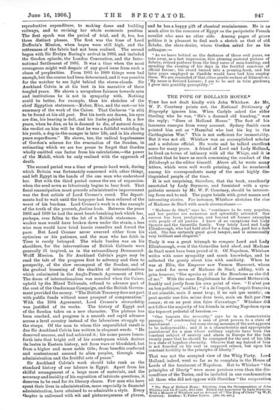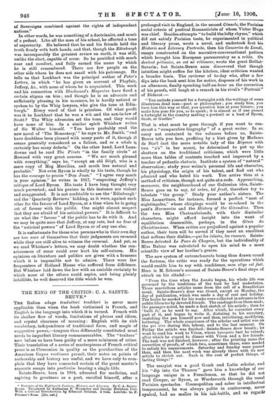THE POPE OF HOLLAND HOUSE.*
TIME has not dealt kindly with John Whishaw. As Mr. W. P. Courtney points out, the National Dictionary of
Biography ignores him. When Carlyle asked the elder Sterling who he was, " He's a damned old humbug," was
the reply ; " dines at Holland House." The fact of his lameness emerges from every account. Sydney Smith once pointed him out as "Hannibal who lost his leg in the
Carthaginian War." This is not sufficient for immortality. But it was not all. Whishaw was an accomplished scholar and a sedulous official. He wrote and he talked excellent sense for many years. A friend of Lord and Lady Holland,. he lived on terms of intimacy with all the Whigs, and it is
evident that he knew as much concerning the conduct of the Edinburgh as the editor himself. Above all, he wrote many letters, which were well worth printing, and he numbered
among his correspondents many of the most highly dis- tinguished people of the time.
It is not surprising, therefore, that the book, excellently annotated by Lady Seymour, and furnished with a sym- pathetic memoir by Mr. W. P. Courtney, should be interest- ing from end to end. The pages bristle with great names and interesting stories. For instance, Whishaw sketches the rise of Madame de Steel with much circumstance :—
" Madame do Stael," says ho, "continues to bo very popular, and her parties are numerous and splendidly attended. Her success has been prodigious, and beyond all former examples with people of all parties. I know of no exceptions but Lady Spencer and the Grenville family. Very lately Lord and Lady Ellenborough, who had held aloof for a long time, paid her a first visit. She has certainly great good temper, and is occasionally very brilliant and eloquent."
Truly it was a great triumph to conquer Lord and Lady Ellenborough, even if the Grenvilles held aloof, and Madams de Stael must have been proud of it. Of Napoleon, Whishaw writes with some sympathy and much knowledge, and he
collected the gossip about him with assiduity. When he was at Elba, the Emperor saw Vernon Harcourt, whom
he asked for news of Madame de Stael, adding, with a
grim humour, "She speaks as ill of the Bourbons as she did of me." With the same Englishman he discussed Metternich frankly and justly from his own point of view. " Il n'est pas
un bon politique," said he ; " it a de l'esprit, do l'esprit francois ; ii est aimable, mais it ment trop ; it no sait que mentir; on peut mentir une foie, meme deux trois, mais on finit par etre connu ; et on ne peut rien faire d'avantage." Whishaw did not follow the majority of his friends in setting Napoleon upon the topmost pedestal of heroism :— "One laments tho necessity," says he in a characteristic) passage, "of condemning a man of great powers to a state of
banishment but some strong measure of the sort appears to be indispensable ; and it is a characteristic and appropriate punishment for a man whose military exploits have been the constant subject of anxiety and alarm in Europe for the last twenty years that he should be consigned for the rest of his life to a state of hopeless obscurity. Observe that my hatred of hint is not founded on his real or supposed crimes, but upon his constant hostility to the principles of liberty."
That was not the accepted view of the Whig Party. Lord Holland, indeed, went so far as to complain in the House of Lords of the treatment of Napoleon. But to Whishaw " the principles of liberty " were more precious even than the dis- comfiture of the Tories, and he included in one condemnation all those who did not oppose with Sheridan " the corporation
• The Pope of Holland House : Selections from the Correspondence of John Whishaw and /no Friends, 18134840. Edited and Annotated by Lady Seymour. With a Memoir of Wbishaw and an Account of " The King of Clubs" by W. P. Courtney. London : T. Fisher Unwin. [10s. 6d. net.]
of Sovereigns combined against the rights of independent nations."
In other words, he was something of a doctrinaire, and much of a pedant. Like all the men of his school, he affected a tone of superiority. He. believed that he and his friends held the truth firmly with both hands, and that, though the Edinburgh was incomparably the greatest review on earth, it was still, unlike the elect, capable of error. So he pontified with much ease and comfort, and fully earned the name by which he is still remembered. There are few people on the other side whom be does not assail with his patronage. He tells us that Lockhart was the principal author of Peter's Letters, in which " he has given an account of Playfair, Jeffrey, &c., with none of whom he is acquainted. This work and his connection with Blackwood's Magazine have fixed a certain stigma on him ; and though he is an advocate and sufficiently pleasing in his manners, he is hardly noticed or spoken to by the Whig lawyers, who give the tone at. Edin- burgh." Every word of that is priceless. Of what profit was it to Lockhart that he was a wit and the son-in-law of Scott ? The Whig advocates set the tone, and they would have none of him. In a similar spirit Whishaw writes of Sir Walter himself. "You have probably read the new novel of The Monastery,' " he says to Mr. Smith, "and have doubtless been pleased with many parts of it, though it seems generally considered as a failure, and as a whole it certainly has many defects." On the other hand, Lord Lans- downe and he read The Pirate "in the family circle" at Bowood with very great success. " We are much pleased with everything," says he, "except an old Sibyl, who is a mere copy of Meg Merrilies, and much less natural and
. probable." Not even Byron is wholly to his taste, though he has the courage to praise "Don Juan." "I agree very much • in your opinion," he writes in 1817, "respecting Jeffrey's critique of Lord Byron. His taste I have long thought very much perverted; and his praises in this instance are violent and exaggerated. It is not creditable to see the Edinburgh' ind the Quarterly Reviews ' bidding, as it were, against each ether for the favour of Lord Byron, at a time when he is going nit of favour with the public. One might almost suspect that they are afraid of his satirical powers." It is difficult to see what the " favour " of the public has to do with it. And we may be quite sure that Jeffrey, at any rate, had no fear of the " satirical powers " of Lord Byron or of any one else.
It is unfortunate for those wise persons who in their own day are too sure of themselves that their judgments are reversed while they are still alive to witness the reversaL And yet, as we read Whishaw's letters, we may doubt whether the con- sciousness of error could ever hurt his self-esteem. His opinions on literature and politics are given with a firmness which it is impossible not to admire. There were few frequenters of Holland House who suffered from diffidence.
But Whishaw laid down the law with an amiable certainty to which none of the others could aspire, and being plainly infallible, he well deserved the title which he won.











































 Previous page
Previous page